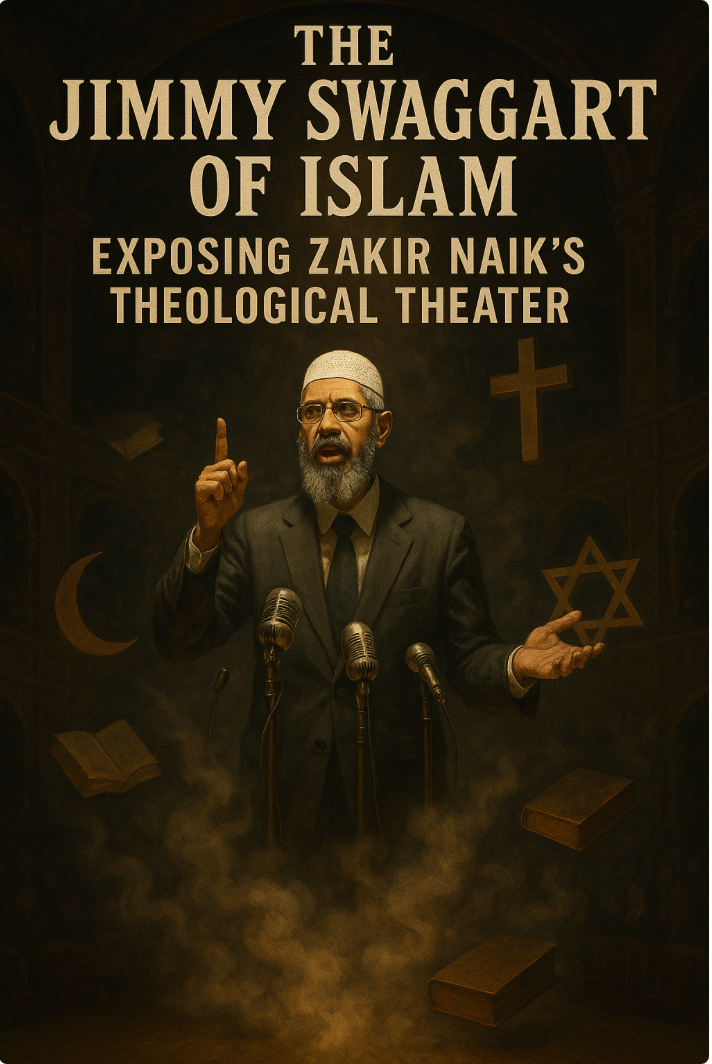

By Tim Orr
As someone who has studied under trained Muslim scholars—men and women who approach the Qur’an and Hadith with reverence, nuance, and integrity—I find it deeply troubling that Zakir Naik is afforded the title of “scholar.” Genuine scholars steep themselves in tafsir, debate conflicting narrations with precision, and submit to centuries of legal and theological discourse with both humility and rigor. They seek hikmah (wisdom), not applause.
Naik, by contrast, trades the tradition of reflective exegesis for performance. Like a stage preacher with a stethoscope, he delivers rapid-fire references and formulaic “gotcha” moments that masquerade as scholarship. His model of da’wah is not a sincere invitation to Islam but a combative contest of “Who wins the mic?” What results is not a theology of conviction, but one of conquest. He does not foster thinkers—he cultivates an audience conditioned to cheer rather than question.
This is not ijazah-backed learning. This is religious showmanship where recall replaces reasoning, and rhetoric replaces reverence. It is a distortion of the classical Islamic tradition that undermines the intellectual and spiritual struggle (ijtihad) that defines the faith's scholarly heritage.
The Spectacle of Certainty: Why Naik Appeals but Does Not Transform
What makes Zakir Naik so magnetic to his followers is not his theological depth—it’s his unflinching certainty. In a postmodern world brimming with humiliation and resentment, especially among Muslim minorities seeking identity and strength, Naik offers instant confidence: Islam, always right; the other, always wrong. But this confidence is not born from spiritual maturity—it’s a weaponized certainty that refuses to wrestle with doubt, nuance, or mystery.
This brand of apologetics is seductive precisely because it removes the burden of critical thought. Why explore Christian doctrine when you can simply dismantle a straw man? Why engage Christian philosophy when a single verse can be thrown at it like a grenade? His version of “comparative religion” isn’t comparative at all—it’s triumphalist theater, designed to produce smugness, not understanding.
And this spectacle has serious consequences. It raises a generation of Muslims armed with religious talking points but lacking the tools of empathy, discernment, or critical reflection. In an age of global dialogue, this is not just embarrassing—it is dangerous. His followers are not formed into mu’minin (believers)—they are fashioned into repeaters of slogans and carriers of grievance.
The Dangerous Fruit of Charisma Without Character
The issue isn’t just poor scholarship. It’s the toxic fruit his platform produces. Zakir Naik’s teachings have been linked not merely to bad theology, but to legal and moral controversy. His Islamic Research Foundation was banned in India under anti-terror legislation. His Peace TV network has been outlawed in countries such as the UK and Canada for inciting hatred. He fled legal accountability, not martyrdom. His self-portrayal as a victim of Islamophobia is a carefully curated illusion, not a reflection of persecution for truth.
This matters because spiritual authority demands moral integrity. When a man builds his platform on spectacle, avoids accountability, and continues to wield influence despite credible accusations of harm, the question is no longer theological—it is ethical. And when that influence shapes the spiritual lives of young Muslims, it becomes generationally damaging.
Naik does not lead people into repentance, holiness, or love of God. He leads them into mimicry, mockery, and militancy of mind. His legacy is not a deeper Islam—it is a noisier one. Not a more faithful Muslim community—but a more self-righteous one. And in an age that desperately needs bridge builders, he remains committed to lighting fires instead.
Who is Dr. Tim Orr?
Tim serves full-time with Crescent Project as the assistant director of the internship program and area coordinator, where he is also deeply involved in outreach across the UK. A scholar of Islam, Evangelical minister, conference speaker, and interfaith consultant, Tim brings over 30 years of experience in cross-cultural ministry. He holds six academic degrees, including a Doctor of Ministry from Liberty University and a Master’s in Islamic Studies from the Islamic College in London.
In addition to his ministry work, Tim is a research associate with the Congregations and Polarization Project at the Center for the Study of Religion and American Culture at Indiana University Indianapolis. His research interests include Islamic antisemitism, American Evangelicalism, and Islamic feminism. He has spoken at leading universities and mosques throughout the UK, including Oxford University, Imperial College London, and the University of Tehran. He has published in peer-reviewed Islamic academic journals. Tim is also the author of four books.
